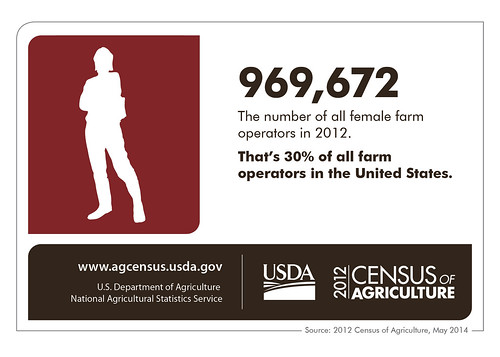
This post is part of the Science Tuesday feature series on the USDA blog. Check back each week as we showcase stories and news from USDA’s rich science and research portfolio.
The 2017 Census of Agriculture is still two years away but, at the National Agricultural Statistics Service (NASS), we work hard to continually improve the data we collect. The agriculture census conducted every five years is the one time we collect demographic information on today’s farmers and ranchers.
The 2012 Census found that 14 percent of the nation’s 2.1 million farms are run by a woman, and women make up 30 percent of all farmers when up to three operators per farm are included. Similarly, 25 percent of farmers were beginning farmers (ten years or less on their current farm) in 2012. But, as we get ready for the next census, we want to make sure that our data fully capture the role of women farmers and beginning farmers in agriculture today.
After releasing the 2012 Census results and based on feedback from stakeholders, we began to explore better ways to quantify the participation of women and beginning farmers in the operation of U.S. farms, given the limited space available on the questionnaire. NASS has asked farmers to identify the principal operators and other operators on the farm. Often the senior male family member is listed as the principal operator, even if he is no longer working. If a husband and a wife are partners on the farm and share equally in the operations, the husband is generally listed as the principal operator. How should the questions be asked so that the participation of beginning farmers and women are more fully identified?
Last spring, USDA Deputy Secretary Krysta Harden and I hosted the first ever USDA Google+ Hangout to examine in images and stories the experiences of today’s women farmers. It was an inspiring exchange that underscored how important it is for agriculture statistics to reflect women farmers’ roles as well.
To address the challenges in collecting additional data and to make sure we are asking the best questions, we commissioned the National Institute of Statistical Sciences (NISS) to convene an independent panel of experts. The panel reviewed the demographic questions on the 2012 Census of Agriculture as well as numerous other surveys. Input from stakeholders and the general public was solicited. The panel made recommendations on how NASS can best capture the changing face of U.S. agriculture in the next census. One of the panel’s recommendations was to ask about the characteristics of up to four decision makers (not operators) per farm and the specific decisions they make for the operation.
We are currently testing this proposed change, along with others. We mailed a draft census questionnaire to 30,000 farmers and ranchers around the country, asking them to help. By completing the form, they will help us determine whether the content, wording, and design enable respondents to provide the information that policymakers, businesses, farmers, and other stakeholders need. Further revisions to the questionnaire will be made based on these results. By participating in the test, farmers and ranchers help improve the 2017 Census of Agriculture questionnaire and help us provide a more precise count of America’s farmers and their contributions.


